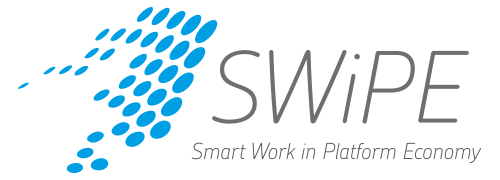 SWiPE researchers Seppo Poutanen, Petri Rouvinen and Laura Seppänen discuss in the latest Workcast-podcast on platform work that crosses through many of the SWiPE consortium’s research themes. Marco Torregrossa, Workforce and Labour Market’s Advisor and a consultant for the European platform workers and freelancers, was the “Arjen ääni” (voice of working days) of the Workcast. Torregrossa himself is also a freelancer.
SWiPE researchers Seppo Poutanen, Petri Rouvinen and Laura Seppänen discuss in the latest Workcast-podcast on platform work that crosses through many of the SWiPE consortium’s research themes. Marco Torregrossa, Workforce and Labour Market’s Advisor and a consultant for the European platform workers and freelancers, was the “Arjen ääni” (voice of working days) of the Workcast. Torregrossa himself is also a freelancer.
Platform work, work transmitted on digital platforms, where buyers and sellers meet in a virtual labour market, is still often a temporary form of work. For example, there are less than 0.5% of Finnish employees working on a platform. Platform work will, however, be expected to increase in the future and provide at least additional income for more people. For those who already work on platforms, the source of motivation for platform work is flexibility, freedom and the possibility for additional earning.
In this Workcast, the SWiPE researchers are pondering, among other things, what opportunities the platform work offers and what kind of workers – both low and highly educated – it will attract. The researchers see that, in spite of many possibilities, it is important to pay attention also to those platform workers who may cause problems, uncertainties or require new regulations.
SWiPE research project has studied, among other things, the world’s largest Upwork platform, which employs white-collar workers, and especially the employees that are registered in Finland. The platform work has raised many questions, including in terms of global competition, sense of community and occupational safety. Although the platform work is based on voluntariness and self-willingness to work on platforms, these questions can become emphasized if the platform work is a form of work that is predominant in a certain field.
SWiPE researchers also discussed how the future regulation would allow a flexible combination of different labour market status. Regulation of a global platform is seen very challenging, although the need for standardized regulation is recognized. The researchers encourage the platform workers to network, exchange experiences and learn from each other.
For the societal debate, the researchers call for composure – things are often seen too black and white. It would be good if platforms and platform work are seen as an opportunity, but so that the basic conditions would be in order.
Marco Torregrossa estimates that those working on platforms have better opportunity to manage their own work. He thinks that the platforms focus more on work performance than on the work hours used. He sees that the threshold to start to work on platform is very low. He also raises the question of regulation as an important issue related to platform work.
Read SWiPE researcher Laura Seppänen’s blog post on platform work on the website of the Finnish Institute of Occupational Health (in Finnish).
Listen the latest Workcast Work on platforms on the website of the Finnish Institute of Occupational Health (in Finnish).
